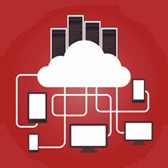
What is Cloud Security?
Cloud security is an approach that typically relies upon a specialized – external IT security company – to remotely manage your business’s data integrity. It can securely store customer data, protect against intrusions, mitigate DDoS attacks, manage a range of security permissions and offer world-class security expertise.
What are the Benefits of a Cloud Security Service?
An in-house IT security implementation is increasingly resource intensive and with data breaches and crypto-virus attacks now common, it is also absolutely essential that security meet exacting standards. Moving to the cloud offers companies several clear benefits over traditional solutions:
- Reduce cost by outsourcing to security professionals who employ economies of scale
- Increase scalability rather than an overbuilding security systems and activate in hours rather than weeks
- Integrate multiple platforms for improved security, efficiency and cost savings
- Improve threat response by leveraging the resources of security specialists
- Ensure that the system is always up to date
What Measures Can you Take to Increase Cloud Security?
Cloud security is meant to help a company leverage specialized expertise and equipment difficult to maintain in-house, but apart from selecting a top security company, there are still measures a security customer should take on their end. It is important to be aware of the location policies of data that may be region restricted. Also, since many intrusions are the result of social engineering, a key security measure involves effective training and auditing of employees so that they don’t fall victim to spear-phishing attacks that can compromise the network and bypass sophisticated cloud security precautions.
What Should you do to Implement Cloud Security?
The success of cloud security across LaaS, PaaS or SaaS type implementations in nearly all industries has given rise to a professional framework. The Cloud Security Alliance (CSA) is an industry group that has established a set of guidelines to ensure best practice among security companies. The Cloud Standards Customer Council also offers a 10 point guide to implementation that may be consulted. Also, the ISO/IEC 27001 certification requirements can be used when shopping for a security solution in order to determine compliance with international standards. In addition, they should pose questions such as:
- Which authentication factors are supported?
- How are encryption keys managed?
- Where are the datacenters located?
- What audit and logging protocols are in place?
Who are the Best Security Providers?
This is a difficult question to answer because there are factors of location, industry, business size, use-case and threat types to consider. It is recommended that each customer consult lists such that of Clouds360 but the membership list of the CSA can also be a great starting point. Big names such as Bitium, Agilance, CypherCloud, Panda, VMware and IBM have earned excellent reputations, but there are dozens of strong competitors now that may provide a more tailored solution for a specific security customer.
